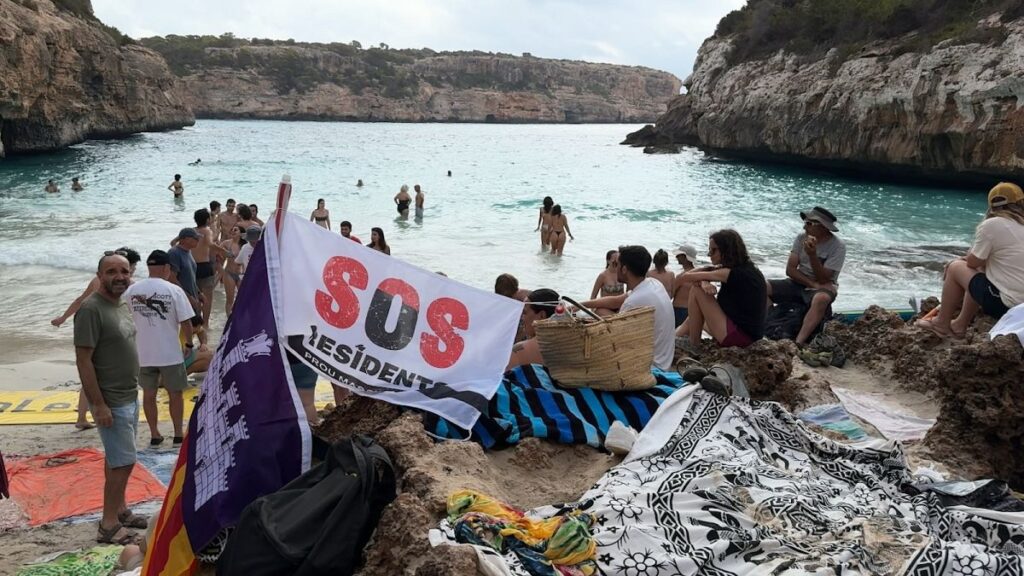A wave of protests against the harmful effects of mass tourism is spreading through Spain’s most popular holiday destinations. Euronews reporter Valerie Goliat travels to Mallorca, the largest of the Balearic islands, to hear from residents who feel their future is under threat.
advertisement
“Go home!” cried a man in a swimsuit, frantically waving at a group of bewildered tourists trying to enter Calo des Moro, one of Mallorca’s most famous and picturesque beaches. He was one of dozens of residents who took over the site early on Sunday to protest against the “massification” of tourism, which they said was having a “devastating impact” on the island and their way of life.
“There are cruises too. [cruise ships] “Thousands of people every day. A plane flying every minute. Too many cars, too much pollution. The beaches are full, the restaurants are full, the streets are full! We’ve had enough!” cried Joana Maria Estrani Vallespiah of the protest group SOS Residents.
“Tourism is killing us”
“A million people come here in one day! We can’t stand it!” roared Sara, a young protester. “They are trying to erase our identity and drive us out, because they bought everything! They say Mallorca lives on tourism? No, tourism lives on us and it’s killing us!”
Mallorca, the largest of the archipelago, has a population of just under one million and is expected to attract around 20 million tourists this year, a new record.
Tourism accounts for almost half of the Balearic Islands’ GDP, which is an economic windfall, but it doesn’t benefit everyone.
All-inclusive packages from major hotel chains and ferry companies that dock their huge ships in the capital, Palma de Mallorca’s port every day, are even having a negative effect on some local businesses.
“There are a lot of people, but since the pandemic, their financial means have been greatly reduced,” said Christina, who works at a liquor store in the city center. “All-inclusive hotels and vacation rentals are on the rise. People prefer to stay in apartments and cook their own meals. At most, they go to a bar for a drink or sangria, sometimes to share.”
Across the street from where Cristina is standing, Cecilia Peña Rossello runs a sustainable clothing store called Hummus. “There are almost only franchises left,” she sighs. “Only franchises can survive on Main Street. The city is losing its identity as traditional businesses disappear.”
In addition to the declining quality of life, a housing shortage is also hitting residents hard.
Rising property prices are causing an exodus, particularly among civil servants, and in Mallorca, with its tourism-driven economy, most jobs are seasonal.
Housing prices are prohibitive for residents
Diego Vila earns more than 2,000 euros a month as a tourist bus driver, but he struggles to make ends meet and is now living in a camper van – he can’t afford rent, let alone buy property.
“The apartments are built for foreigners, the prices are for foreigners and they are exorbitant. The situation has made me think many times about leaving Mallorca.”
Diego’s daughter, Flore, lives in another camper van right next to his house, and she prefers this lifestyle to apartment shares, the only way to provide housing for the island’s growing number of young workers.
advertisement
“I work as a waitress and earn quite a bit compared to other places in Spain. Still, it’s hard to rent an apartment on your own. And here I have more independence than in a shared house.”
Sociologist and former left-wing city council member Noys Trujoll blames much of the growing instability on international speculation and the island’s new right-wing majority.
“Wealthy people and companies with a lot of capital come here to invest, to buy homes. It’s a very lucrative speculative business because they know that house prices are rising every year. With 80% of fresh food being imported, house prices and shopping basket prices are so high that working families can’t survive,” she says. “In recent years, measures have been taken to ban tourists from renting detached homes in Palma and to limit the number allowed in the city, but now such efforts have been stopped.”
But faced with growing anger among residents, local authorities have promised new measures to curb mass tourism.
advertisement
The road to collapse
That’s not enough, says Margarida Ramis, head of Mallorca’s main environmental group, GOB, for whom climate change makes it urgent to overhaul and diversify the island’s economic model.
“More than half of the municipalities in Mallorca have no drinking water. Some municipalities have water restrictions but these do not apply to the hotel sector,” she sighs.
“Protecting soil and water fertility should be a strategic priority in economic policy, but it isn’t.”
advertisement
The reality is that there are now plans to expand the operational capacity of Palma airport and to expand the port of Palma. There is also a decree allowing the creation of more tourist sites on rural land. Clearly, we are accelerating the path to collapse.”
Estimates suggest that tourist numbers in Spain are expected to reach an all-time high in 2024.
Click on the image above to see the full report


